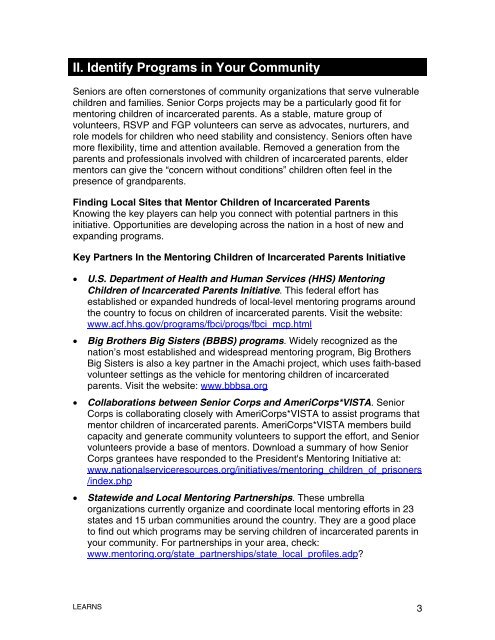Children of Incarcerated Parents
Children of Incarcerated Parents
Children of Incarcerated Parents
You also want an ePaper? Increase the reach of your titles
YUMPU automatically turns print PDFs into web optimized ePapers that Google loves.
II. Identify Programs in Your Community<br />
Seniors are <strong>of</strong>ten cornerstones <strong>of</strong> community organizations that serve vulnerable<br />
children and families. Senior Corps projects may be a particularly good fit for<br />
mentoring children <strong>of</strong> incarcerated parents. As a stable, mature group <strong>of</strong><br />
volunteers, RSVP and FGP volunteers can serve as advocates, nurturers, and<br />
role models for children who need stability and consistency. Seniors <strong>of</strong>ten have<br />
more flexibility, time and attention available. Removed a generation from the<br />
parents and pr<strong>of</strong>essionals involved with children <strong>of</strong> incarcerated parents, elder<br />
mentors can give the “concern without conditions” children <strong>of</strong>ten feel in the<br />
presence <strong>of</strong> grandparents.<br />
Finding Local Sites that Mentor <strong>Children</strong> <strong>of</strong> <strong>Incarcerated</strong> <strong>Parents</strong><br />
Knowing the key players can help you connect with potential partners in this<br />
initiative. Opportunities are developing across the nation in a host <strong>of</strong> new and<br />
expanding programs.<br />
Key Partners In the Mentoring <strong>Children</strong> <strong>of</strong> <strong>Incarcerated</strong> <strong>Parents</strong> Initiative<br />
• U.S. Department <strong>of</strong> Health and Human Services (HHS) Mentoring<br />
<strong>Children</strong> <strong>of</strong> <strong>Incarcerated</strong> <strong>Parents</strong> Initiative. This federal effort has<br />
established or expanded hundreds <strong>of</strong> local-level mentoring programs around<br />
the country to focus on children <strong>of</strong> incarcerated parents. Visit the website:<br />
www.acf.hhs.gov/programs/fbci/progs/fbci_mcp.html<br />
• Big Brothers Big Sisters (BBBS) programs. Widely recognized as the<br />
nation’s most established and widespread mentoring program, Big Brothers<br />
Big Sisters is also a key partner in the Amachi project, which uses faith-based<br />
volunteer settings as the vehicle for mentoring children <strong>of</strong> incarcerated<br />
parents. Visit the website: www.bbbsa.org<br />
• Collaborations between Senior Corps and AmeriCorps*VISTA. Senior<br />
Corps is collaborating closely with AmeriCorps*VISTA to assist programs that<br />
mentor children <strong>of</strong> incarcerated parents. AmeriCorps*VISTA members build<br />
capacity and generate community volunteers to support the effort, and Senior<br />
volunteers provide a base <strong>of</strong> mentors. Download a summary <strong>of</strong> how Senior<br />
Corps grantees have responded to the President's Mentoring Initiative at:<br />
www.nationalserviceresources.org/initiatives/mentoring_children_<strong>of</strong>_prisoners<br />
/index.php<br />
• Statewide and Local Mentoring Partnerships. These umbrella<br />
organizations currently organize and coordinate local mentoring efforts in 23<br />
states and 15 urban communities around the country. They are a good place<br />
to find out which programs may be serving children <strong>of</strong> incarcerated parents in<br />
your community. For partnerships in your area, check:<br />
www.mentoring.org/state_partnerships/state_local_pr<strong>of</strong>iles.adp?<br />
LEARNS 3

















